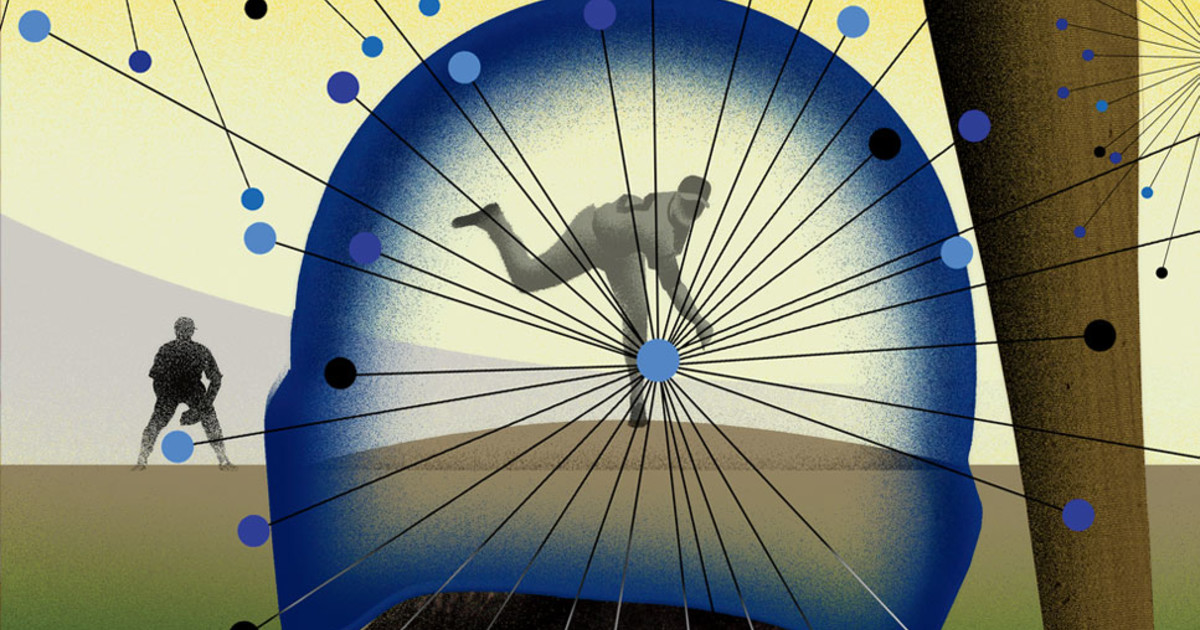PoliticalChic
Diamond Member
"When Ruth was asked if he thought he deserved to be making more money than President Hoover, he said, “'Why not? I had a better year than he did.” Yet Hoover's enduring delight in baseball deserves to be remembered as more than the punch line of a humorous story." Google
I just received the latest copy of my alma mater's magazine, and was pleased to find an excellent article on my fav, baseball:
1. "Brain Games: How the Mind Performs Under Pressure
What neuroscience and psychology can tell us about baseball – and ourselves.

 magazine.columbia.edu
magazine.columbia.edu
2. For most mortals, making any contact with the ball would have been next to impossible. A pitch traveling at ninety miles per hour from the pitcher’s hand to the catcher’s glove takes about four-tenths of a second, and it takes a full two-tenths of a second for the brain to send a signal to the muscles to respond. “That leaves your brain with two-tenths of a second — half an eye blink — to be able to see the pitch as it’s coming in and decide whether or not to swing,” says Zach Schonbrun ’11JRN, author of The Performance Cortex: How Neuroscience Is Redefining Athletic Genius.
3. The decision is complicated by other factors: the type of pitch (fastball, curve, slider), its location (high, low, inside, outside), the situational stress (in Larkin’s case, extreme), the noise of the crowd (ditto). “Anything that clouds the hitter’s focus eliminates the possibility of squarely hitting the ball,” Schonbrun says. “There’s just not enough time during a pitch for a hitter to readjust.”
4. “To understand the brain is to understand action,” says Daniel Wolpert, a neuroscientist at the Zuckerman Institute and a leading authority on motor control. “We tend to think our brain is there for us to perceive the world, but the brain’s most basic function is to move our bodies, whether to evade a threat or to interact with others through speech or gestures. The only way to affect the world is through the control of movement.”
5. Whether we’re biking in traffic or trying to hit a moving ball, there is a delay between the eye seeing and the muscles reacting. “It takes time for the retina to respond, for the information to get to your brain, and for the body to respond,” says Wolpert. “That means that when you want to make fast movements in sports, you have to predict ahead of time. Prediction is fundamental. You have to anticipate where the ball will be.”
I just received the latest copy of my alma mater's magazine, and was pleased to find an excellent article on my fav, baseball:
1. "Brain Games: How the Mind Performs Under Pressure
What neuroscience and psychology can tell us about baseball – and ourselves.

Brain Games: How the Mind Performs Under Pressure
What neuroscience and psychology can tell us about baseball – and ourselves.
2. For most mortals, making any contact with the ball would have been next to impossible. A pitch traveling at ninety miles per hour from the pitcher’s hand to the catcher’s glove takes about four-tenths of a second, and it takes a full two-tenths of a second for the brain to send a signal to the muscles to respond. “That leaves your brain with two-tenths of a second — half an eye blink — to be able to see the pitch as it’s coming in and decide whether or not to swing,” says Zach Schonbrun ’11JRN, author of The Performance Cortex: How Neuroscience Is Redefining Athletic Genius.
3. The decision is complicated by other factors: the type of pitch (fastball, curve, slider), its location (high, low, inside, outside), the situational stress (in Larkin’s case, extreme), the noise of the crowd (ditto). “Anything that clouds the hitter’s focus eliminates the possibility of squarely hitting the ball,” Schonbrun says. “There’s just not enough time during a pitch for a hitter to readjust.”
4. “To understand the brain is to understand action,” says Daniel Wolpert, a neuroscientist at the Zuckerman Institute and a leading authority on motor control. “We tend to think our brain is there for us to perceive the world, but the brain’s most basic function is to move our bodies, whether to evade a threat or to interact with others through speech or gestures. The only way to affect the world is through the control of movement.”
5. Whether we’re biking in traffic or trying to hit a moving ball, there is a delay between the eye seeing and the muscles reacting. “It takes time for the retina to respond, for the information to get to your brain, and for the body to respond,” says Wolpert. “That means that when you want to make fast movements in sports, you have to predict ahead of time. Prediction is fundamental. You have to anticipate where the ball will be.”